I got an email today from a man in Colorado. He was writing to tell me that he and his son had somehow just discovered Andromeda, and that they had both been moved by the actions and intentions of the character, Tyr. It’s always touching to get such attention so long after the fact. It compelled me to throw these writings up here one more time. There are still other places you can see them, but they have endured, for some, like the character, and I thought they should have a permanent home.
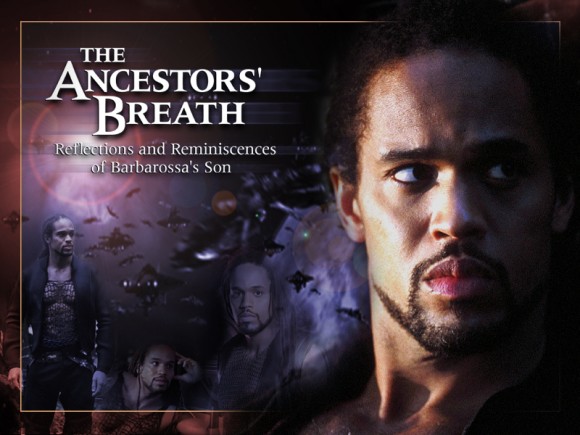 These “journal entries” from the perspective of the character, Tyr, were written as an exercise meant to hopefully provide dimension to a character who was far more complex in my mind than he was for the exigencies of production. It’s far easier to produce content about facile characters, but they are equally that much less interesting or fun to play. I cannot speak for the viewership, but my sense was that such characters are never particularly interesting to watch either… I had endeavored, in The Ancestors’ Breath, to explore the depth of the character’s actions and intentions as informed by his back story; his heritage, his changing life circumstance, and a whole lot of stuff that I just simply made up regarding how I assumed such a species (genetically engineered super-human) would most realistically behave. They were a help to me, creating psychology and sensibility where, for the sake of the camera, there were only general ideas.
These “journal entries” from the perspective of the character, Tyr, were written as an exercise meant to hopefully provide dimension to a character who was far more complex in my mind than he was for the exigencies of production. It’s far easier to produce content about facile characters, but they are equally that much less interesting or fun to play. I cannot speak for the viewership, but my sense was that such characters are never particularly interesting to watch either… I had endeavored, in The Ancestors’ Breath, to explore the depth of the character’s actions and intentions as informed by his back story; his heritage, his changing life circumstance, and a whole lot of stuff that I just simply made up regarding how I assumed such a species (genetically engineered super-human) would most realistically behave. They were a help to me, creating psychology and sensibility where, for the sake of the camera, there were only general ideas.
For the fans of the character, I suppose that these writings amounted to little more than fan fiction from the horse’s mouth. And that’s fine… Who better, in fact, to write it?
For those interested in perhaps a slightly more insightful, less fictional take there is an interview here for an online magazine called Rebublibot. It’s the last interview that I did on the subject of Andromeda, acting, and Sci-fi. It’s actually quite comprehensive.
For any others, those who remain, or those who are newly interested, here, in eight separate posts, are all eight entries to The Ancestor’s Breath: Reflections and Reminiscences of Barbarossa’s Son.
Whispers in the Void
“You are the center of the wheel”, my father would speak into my ear as he rocked me to sleep in his arms on the nights that from among his wives my mother called him to come to her. “All things revolve about you. You are the only god; your strength the greatest strength; your arm the fellest arm.” These words he whispered even as his massive biceps pressed me about the ribs restraining my breath, and my head rested no differently than some fragile paper thing, unarguably crushable in the gulf of his huge hand. “No value is greater than yours; no glory greater save that which will spring from you.” I was nearly eleven with the physical stature of any average sixteen-year-old human boy when the blitzkrieg of the Drago-Kazov betrayal brought an abrupt end to this practice and changed the nature of all that I knew and would know. Were it not for his death at their hands, I have no doubt that Barbarossa would have continue to enact the ritual, despite my daily increasing size and weight, for yet some time to come.
While physically, at ten years old or so, the Nietzschean youth is already quite imposing in relative terms, emotionally, not unlike the human adolescent at that age, there yet remains to ensue a great deal of development. This abundance of physical strength in combination with the paucity of emotional restraint brought about in us an incessant and irrepressible riot of unfocused masculinity, and set we young men of Barbarossa’s brood about the constant engineering of a whole host of ridiculous, unscrupulous, and to our minds, “mannish” endeavors. Suffice it to say that we had all long since grown more than weary of hearing the words. The safety and comfort of his embrace which we each of us once longed for had since turned to revulsion at the prospect, and utter embarrassment on the actual occasion of this rite, as infrequent but inevitable as it was. At such an age to be wafted still into the air as if we weighed nothing and held in that same effortless iron grasp; to be rocked like an infant gently back and forth until he had several times uttered all his litany into our ear was an insufferable imposition that we were made to suffer in spite of ourselves with waxing and waning degrees of underdeveloped Nietzschean stoicism. My newfound intolerance was, in fact, the only thing that had changed from the time I could first recall it. I no longer fell asleep in his arms, but as we all did once struggle proved futile, I rallied failingly to endure the entire ordeal waiting to be set down on my own feet again, and set free to go and bear the brunt of the ridicule leveled at me by my brothers and half brothers for the rest of the evening. Barbarossa had not changed at all. His ritual, and that of the pride’s other male elders, remained a gentle one, which caused no physical discomfort. And yet it is only at this distance that his forced nearness, now so long absent, begins to induce the sense of sacred connectedness and impart the lesson for which it was, by design, intended. Here, clearly, lay the sublime magic of the cumulative Kodiak mind that no self-respecting Nietzschean adolescent would let slide his well-studied self-awareness long enough to have felt or learned from then. Regardless, I was to hear it, and hear it again; that I was king; that I was the absolute and unrivalled, while yet I could not have broken free of the satin vice his immense arms constrained me in had I fought, as I oft times did, with all my strength. Such was the huge disparity between the awesome might of the Kodiak sires and that of their rapidly maturing sons. And though there are most likely no sons left but I who still draw breath, were they about and holding forth in the infinite corners of the universe, (and I do so hope they are) their lonely insignificance painted upon the unquantifiable greatness of space would, I think, have them remembering this as I do. At this immeasurable distance from Barbarossa’s arms; at this long age removed from the smell of his breath on my face in the cool of the evening, sweet and clean from chewing Antarian mint leaves; from the feel of his muscled neck upon the bridge of my nose, chiseled and hard, warm and vibrating with the bass timbre of his voice as it shook me; from the scent of his frame come fresh from the bath to lie with my mother; from the unrushed melody of his exhortation as it fell upon my ear; from the helplessness and security that his fingers, feathered through my hair to hold my head in his proprietary grasp, made me feel both at once; from the words themselves said over so many times that they, along with solitude, are now become my only unflagging and constant companions, I understand the depth and breadth of the only Nietzschean doctrine that will ever truly matter here in the supreme abyss that cradles us all, rocks us in its arms, and has no use for any of our petty plans, yet deigns our thriving if we will only own our primal right, and exercise our will to power.
Suleiman, sire of Temujin I, then four generations removed from Temujin II, sire of Barbarossa watched the death throws of The Systems Commonwealth in the conflagration of Witchhead, and watched the only united Nietzschean front since Museveni collapse and die right along with it. According to the Than historian, Snow Laden Branches, despite the absolute evisceration of the Argosy by the Nietzschean strike force in the first few days of “The Nietzschean Betrayal”, the Commonwealth somehow miraculously managed to bounce back and engage it’s enemy to a stalemate in an out and out war of attrition for another two years. This biased account tends to paint the picture of an epically heroic High Guard recovering unexplainably from its unequivocal devastation and valiantly fighting on into perpetuity fueled, apparently, by nothing more than the power of right, that dubious quantity (that a certain endearing High Guard relic bandies about to this day), which may have its place, but has never won a war in all the annals of recorded history – EVER!! The first strike against the High Guard forces was the culmination of years of intricate planning and design on the part of myriad disgruntled Nietzscheans mobilizing in the very breast of The Systems Commonwealth, which did not notice for being much too busy engaging in the self-deluding politics of “benevolent imperialism”. In brief, The Commonwealth had grown fat on its own sense of altruism, and far too secure with its unmanageable expanse of worlds, which had all come to drink from the same cup with visions of an impenetrable interspecies brotherhood as bulwark against the terrible darkness. Fear of isolation masqueraded as right-minded good will. (Ironically, I imagine that no world ever felt so very alone until the slipstream gave them cognizance that someone else was in fact there. But perhaps that’s another discussion entirely.) In this oxymoronic climate of self-righteous cohesion that yet spread itself untenably thin over a trillion lightyears, the attack on the Argosy and ground forces was a Hammer-of-God offensive; an Alpha-and-Omega coup de main which could not have failed. So why did it? Suleiman “The Sultan” Anasazi, observing the end from the command deck of a commandeered freighter christened The Gift of Industry, refitted for war and renamed Prides’ Provocateur, admired the pluck of the High Guard captains, and the seemingly inexhaustible bravery and stamina of their corps. Even so, all the years of Academy instilled esprit was no match for a united Nietzschean offensive launched at the High Guard not only from the outside, but from within as well by great numbers of battle hardened Nietzschean officers who for years had lived and served peaceably among its ranks. Nor was it any match, once the battle was engaged, for the killing potential spawned by ten or so generations of strict Nietzschean selective breeding. Or…perhaps the finely hewn Nietzschean pedigree was, in fact, the problem. For Suleiman, the study of the Nietzschean foe, himself included, or at least that which lay restive in his Nietzschean heart in the last days gave him most clearly to understand what had happened in the first, answering the greatest question of the two years past. Why did the united Nietzschean front, or at least their supremacist conceits, go down to ultimate defeat? They ran.
Suleiman had fourteen wives, including two daughters of the then Kodiak matriarch, Katherine Melchior. He had the most wives after her son, the Alpha, Aragon, in all of Kodiak history, hence the nickname, “The Sultan”. (A note on this misnomer: The Nietzschean culture is a matriarchy. Nietzschean women choose their mates, always. The roles are never reversed, and a record number of women chose Suleiman. Nietzschean men tend to like to make legends of themselves and then, perhaps, each other, in that order. My great ancestor, proud Suleiman “The Sultan” was no more than a man, though a solid specimen he must have been.) His first son by Katherine’s first daughter was Temujin, who would become the most notable Kodiak Alpha to spring from the Anasazi line so far as I am able to ascertain. Unlike his father, Suleiman, Temujin cared nothing for the reading of foreign doctrine or reflection upon foreign ideas. No variant of pure Nietzschean ideals clouded his constantly calculating mind in any moment of repose. In his gargantuan and capable frame lived only the simplest of drives; those for survival and procreation, unencumbered by philosophy of any strain. His razor intellect was simply and wholly a means to some unmitigatedly primal ends. He killed and he made life by rote and in great quantity, passing on the most characteristic of Nietzschean genes as they had been past on to him. He was what is known in Nietzschean parlance as a “Dragonian”; a Nietzschean whose dominant traits have been in no way softened or compromised in the process of evolution since the progenitor first spawned the species. The scholars argue that the Dragonian ideal has of this date, by and large, so faded from the heart of the Nietzschean philosophy that we are true Nietzscheans no longer. They site the more and more common occurrence of characteristically human proclivities in latter day Nietzscheans, particularly adult males, from a heightened aesthetic sense taking the place of the normal predilection for pragmatic thought to a startling trend in some circles toward monogamy and much in between. My father with his mint leaves, was the only Nietzschean I ever knew to chew something he had no intention of swallowing. Again, perhaps this is fodder for some future dialectic.
For now, Suleiman, believing that for an unabandonable cause he had allied himself to an infallible host with an unflappable resolve, watched the various contingents of the “united” Nietzschean force fleeing the Battle of Witchhead with a great deal more fascination then surprise, but surely an unwholesome taste of both. There had been that cataclysmic anomaly, now the stuff of legend, which had literally evaporated the majority of the Nietzschean fleet. (Knowing of that legend what I know now, it continues to taunt my consciousness like the stuff of a vengeful dream. Even now I am not certain what occurred that day, or what part I may have played.) Regardless, the High Guard Argosy had been thrashed and trimmed to indefensible numbers prior to that. At worst, “The Angel of Death” explosion notwithstanding, the sides were again even. However, few in the surviving Nietzschean armada had stayed to observe this fact, having been frightened away by the apparent impending doom of the great blast. From first to last, the Nietzschean individual in critical numbers had defected the mission at any and every moment wherein victory was not absolutely assured. Many a mighty Dragonian had run home fleeing expected death, choosing life and progeny instead, even under a stumbling Commonwealth inclusive of the bloodthirsty Magog.
Suleiman was perhaps the most vocal opponent of the Treaty of Antares, and proponent of the search-and-destroy campaign bent on the extermination of the Magog race that the Nietzschean worlds stood poised to spearhead following the events of Brandenburg Tor. He, like myself, was a watcher, and his intransigent stance on the issue sprang directly from the observance of those events, as well as a growing distrust with a Commonwealth gone peace-and-love crazy in the face of them. The matter was a simple one. How could a social body comprised of sentient beings ever hope to embrace and bond with a species that required the acquisition, infestation, and death of those same sentients in order to exist? It was not only the Nietzschean diaspora that saw the impossibility of the treaty, though they stood alone in blatant opposition. Several other races and species were not yet so secure in the bosom of the Commonwealth that they were blind to the utter inanity of it as well. However, in the halls of deliberation, the choices were implicit. A people could speak out and incur the disfavor of what the Nietzschean opposition derisively dubbed “The Great Parent”, risking isolation, and in the face of the new, inconceivable horror, set themselves up to be the next Brandenburg Tor where the agonizing cries of those being slowly devoured were lost in the black silence of space. Or they could sit quietly in concurrence with the body politic, mutter platitudes about fellowship, and bask in the false security of numbers flung wide over far too much space to be real. For Suleiman and his constituents, it was an awe inspiringly ludicrous proposition, pointing up the Commonwealth and its vast expanse of voices to be nothing more than a retarded child when it spoke. Nietzscheans, Dragonians in particular, it was commonly known, would euthanize the rare defective offspring in utero. Haply for the Commonwealth, they would also run from any fight that they could not clearly win.
“Cowardice” is a human word, and one not definable in the Nietzschean lexicon. Perhaps this is not entirely true, but my father and grandfather both would admit no use of the term. Their teaching was that there is only concern for the needs of the self and its obvious extensions, or the lack of it. However, I think by the time they had begun to shape such thoughts, it had already long since become quite unclear, in Nietzschean consciousness, what the self needs. I imagine that as Suleiman watched the rear echelon of support craft peel away from the battle before them toward points unknown, but most probably towards home, he could not have looked upon them with anything akin to contempt. Rather I must believe that his perceptions roused a host of other disturbing emotions, all unsettling for the fact that they were none of them completely Nietzschean or non-Nietzschean in origin. If his data handed down through the generations is any indication, we know that he watched with “a sadness” at the still viable opportunity for victory erroneously abandoned. Beyond that, conjecture based upon that same data would suggest that he watched, perhaps with a wish that either the Human or the Dragonian held a more definitive jurisdiction over his divided soul. Possibly, he watched wondering and fearful, not of the approaching enemy, but of how his propensity for over-thinking, for strength of conviction, and, to his own self-disgust, for what seemed to smell suspiciously of some empty human quantity like honor which had somehow found its way into his genetic code might doom his entire line to extinction while the fleeing Dragonians might sail home to thrive and grow stronger into perpetuity in the way that Charles Darwin had propounded and Paul Museveni had intended. But I do think that mostly, in his solitude; “in his own most midnight, most mid-day solitude”, he must have watched with the sharp loneliness of any man left to the contriving elements to make of himself what he might with only the dubious gifts of an evolving nature to guide him. Alone. Left to the arbitrament of the unexplainable, irrepressible, and threatening forces within him and without.
While the Nietzschean worlds had subsisted as peaceful members of the Commonwealth for generations, it had not been without the sacrifice of several and varying aspects of the Nietzschean way of life. For instance, as members in good standing, it was quite obviously deemed no longer appropriate that they live and grow strong on the backs of slaves. Nor could conqueror nations, as all the Nietzschean worlds at one time were, draw strength and expand through conquest as they always had. And what then are conquerors to do but evolve, and not necessarily toward the better? Inter-pride mating increased exponentially during this period of forced change, perhaps in an instinctual attempt at Pan-Nietzschean cohesion to take the place of the “fittest pride take all” mentality that had been decreed by the non-Nietzscheans, and conceded to by their new Nietzschean brethren, to be officially out of fashion. It was no less foolish of both parties not to see that the alliance could only ultimately work to the detriment of each than it was not to see the folly in the Treaty of Antares. It was as moronic of the high-minded Commonwealth to expect Nietzscheans to be anything but Nietzscheans as it was to expect Magog to be anything but Magog. Yet and still, the space of time wherein the Nietzschean diaspora had gone about the process of re-adjusting to the new rules was time enough for the High Guard to indoctrinate and absorb into its ranks a huge cross section of “evolving Nietzschean” troops, (not an Alpha or Dragonian in the lot we can be sure). It was a Nietzschean captain in command of a High Guard heavy cruiser called Lux Aeternus who accepted the surrender of Prides’ Provocateur and her crew. Not, however, before Suleiman dropped him to the deck with a fist to the face and sustained a Gauss Gun blast from a member of the boarding party that completely dismembered his left arm. It was an idiotic maneuver, to look at it from a point of Nietzschean purity, and one that rendered him an obvious inferiority for the rest of his days. It was a baldly un-Nietzschean action sprung from a primal Nietzschean mind set, for it was in keeping with the fidelity to his will that came exploding fist first out of his present state of confusion surprising everyone, himself included I presume. I am left to wonder if the High Guard captain, Suleiman, and those on their way home were three stages in the study of Nietzschean evolution in the age of The Great Systems Commonwealth. I believe Suleiman, sitting in the enemy brig nursing his wound, must have wondered as well.
He was held by the remaining High Guard forces for a brief time, but there was hardly any governmental structure left in place that might effectively try him for war crimes. Besides which, there were far more pressing matters that demanded the attention of the ragged remnants of the Argosy. The Magog swarmed unchecked into the post-Witchhead entropy and the bloodbath that ensued, I must guess, left the shattered Commonwealth wishing they could turn back the clock and rethink all things from the treaty onward. Whether or not this last is true, what cannot be argued is that the Human was grossly ill prepared to repel the onslaught of the septic and insatiable creatures with the protective apparatus of “The Great Parent” in such irreparable disarray. Nietzscheankind, on the other hand, seemed to all too efficiently revert immediately back to pride specific modes of defense, each unto itself, where the long dormant and quasi-dormant elements of their nature awoke with a vengeance to best protect them from anything and everything including each other. Pride rivalries long put aside were rekindled, and Nietzschean worlds, in a primal Nietzschean xenophobic hysteria, focused reborn and unadulterated Nietzschean viciousness and might on expanding their zones of comfort against Magog and all other comers else. The Drago-Kazov and the Jaguar Prides battled for supremacy. The Kodiak Pride, my people, who had always lived a distant third in the clan hierarchy, inexplicably abstained from the civil fray, triggering heated debate amongst themselves and among the Prides at large. It had been no secret for some time, and in fact, the focus of much interest and dialogue, that the Kodiak were changing. Certainly Suleiman could not have been the first to see it. “Weakening,” said the voices of many. “Growing” was the observation of a lesser school who, in their own evolution, may have been unwittingly influenced. Whatever the case, apparent to all observers was the fact that the days of the Kodiak as hunter-killers first and foremost were fading. In the company of a hundred or so million newly primalized Nietzscheans the observation could not have boded anything but ill.
To all the warring Prides the Progenitor’s remains were sacred. And so it was a mutually undisputed fact that for any to keep them in the midst of what promised to be a melee unrivalled in the annals of Nietzschean history meant risking the loss of them to all Nietzscheankind forever. In light of that, and amidst bitter contention, the remains were entrusted to the Kodiak. Sabra, Orca, Jaguar, Drago-Kazov, Mandau, and eleven other Prides, even as they fell to one another’s throats in the protracted civil conflict, created an allied guard to protect the demilitarized zone; an unobtrusive solar system encompassing a less obtrusive world whereon the Kodiak enshrined the most holy and, in fact, only Nietzschean icon. Evidently, the arrangement was ill-conceived. Drago’s bones rested peacefully for the duration of the Nietzschean war, but the utter annihilation of the Kodiak Pride in its aftermath would attest loudly to the fact that they, in their state, were no fit keepers. Or perhaps not. Perhaps it was all part of another cumulative Nietzschean plan that all but the self-absorbed Kodiak were privy to; a calculated design to make some practical use of the aberrant Pride in their midst until such time as a safe haven for Drago could be provided by a fitter Pride without more immediate life and death concerns taking precedence. Either way, the evolving Pride emerging out of the genetic confusion that the Commonwealth had caused; the Kodiak, stood no chance. Like Witchhead’s Angel of Death, I have no clear understanding as to the whys of the holocaust that consumed my people. Aboard the Andromeda Ascendant there is no shortage of time to deliberate upon it at great length daily. It haunts me here. And may the torments of its visitation never cease, for Barbarossa would not have me die his death. What I remember of him; of them, is that, wherein Drago was the cause, the Kodiak were not so significantly unlike their warring relatives. They were, all of them, Nietzscheans at the roots. They were dutiful to their charge. They rode roughshod over the weak and inferior they encountered in their space. With their own particular fierceness they fought the Magog swarm upon swarm, and they raised their many strong and willful children under cover of the Long Night. I am one, if for all that the Kodiak did or did not in their time define, I am one alone.
Of course, it is all speculation now, but from this vantage, I must believe, or perhaps I should only very much like to believe that Suleiman, unceremoniously returning home, could not have been the Suleiman who left to do battle, a committed and principled idealist, and an integral part of the united Nietzschean conspiracy. The practicality of expending no significant time or energy in mourning death or lamenting one’s own misfortune was as instinctual as attempting to avoid them; neat and efficient, and as identifying a trait as the chipped and broken bone blades reposing on his right forearm. Yet by this time instinct had surely long since been called into question, and the death of possibility as he had come to recognize it loomed so very large a thing that his anguish must have certainly spilled out despite him through the several cracks that the lost war had opened in his Nietzschean veneer. Beneath it, the warrior, in his confusion, was ashamed to be feeling so ashamed. And so, disillusioned with the whole of Nietzschean potential; surely disenchanted with the very idea upon which the entire tactical offensive was predicated; that Nietzschean greatness lies in its united numbers and can vanquish all; convinced, perhaps irrevocably, that if the Nietzschean man is in fact great he is great unto himself and unto himself alone, he might have snatched up into his one remaining arm the first of his children that came to welcome him. If I may fantasize further, perhaps that child was Temujin who, by all accounts, was so very Dragonian that by the age of three or so he could not even suffer the playful competition of his brothers without causing them considerable hurt. Perhaps, in his homecoming, perhaps even before saluting his wives; before the first obeisance to the Matriarch, in the wake of all that had not worked; that had not been proven true; that had simply not been, on the sunset edge of the bloody, endless night, now imminent, irrevocable and so unnecessary, he was struck by the desperate need to do yet another blatantly un-Nietzschean thing and solace a keening spirit by granting a sire’s permission to all his heirs. To Temujin it was the permission to be the relentless and unimpassioned, virile destroyer it was obvious he was destined to be. To another of his brood perhaps it was the permission to indulge some other newfound tendency toward compassion, or introspection. To another, permission to listen more closely to whispers in the void speaking ever louder of philosophy or religion that as yet no Nietzschean would consider. Perhaps, in his fury, he did not stop until he had given each and every last of his Nietzschean boys permission to be Nietzschean men, which was coming, it seemed, to mean, permission to be anything but complacent; to be anything; to explore any un-Nietzschean muse whatever provided their individual, unbridled, Nietzschean will to power could purchase them the leisure. The will to power. It is this, this alone, if nothing else, that must never be softened by breeding. Throughout our evolution we must guard it and hold fast to it. It is sacrosanct. For the epiphany of the Nietzschean War was that the cosmos chooses no sides. And only the man alone, naked, unsupported, identified only by his intent, his solitary will, and his ability to work it, can hope to thrive in the permuting, angry age. Beyond this, strong, swift, and virile are the only Nietzschean genetic imperatives; these that the common eye recognizes as the archetypical attributes governed by his labeling propensities for fight, flight, and procreation. Infinitely more than that, however, they will forever facilitate the freedom of Nietzschean men to be and become what life and living has begun to make of them. To make of me, who is Tyr, and who, I must trust, is grown from Barbarossa, who is grown from Temujin II, who is grown at length from Temujin I, who is grown from Suleiman. And he, mighty he, in the beginning, said perhaps for the first time, and then again, and again, and again to Temujin who, with the extremes of his power and prowess, struggled helplessly caught up in his father’s immovable one-armed embrace, “You are the center of the wheel. All things revolve about you. You are the only god; your strength the greatest strength; your arm the fellest arm.”


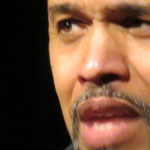

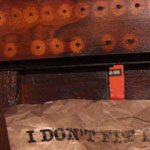

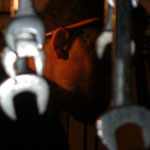

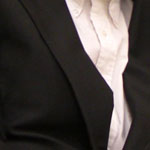

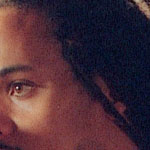



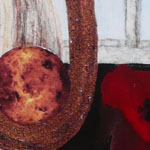
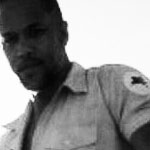

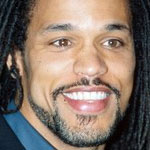
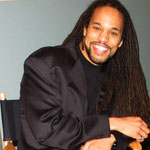
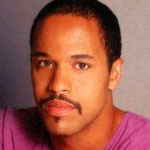
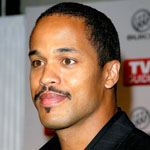
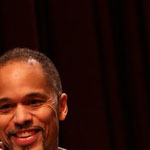
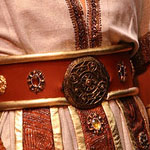
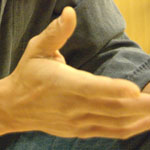
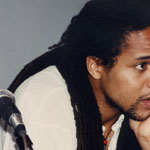
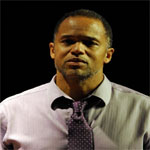
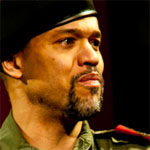
Something about this makes me ache. It is beautifully written. Thank you.